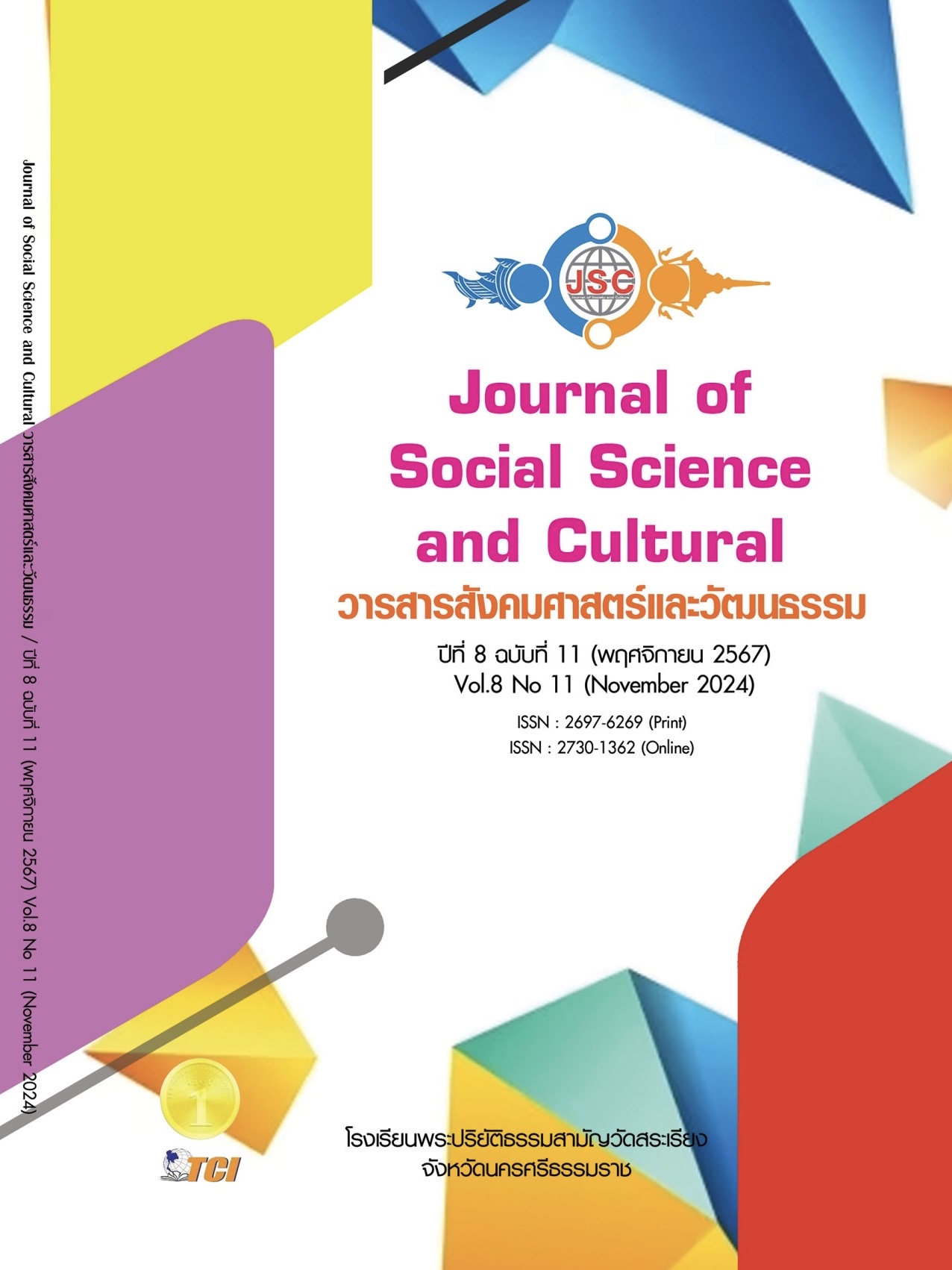COMMUNICATION OF THE LOCAL GOVERNMENT LEADERS TO CREATE A DIGITAL ORGANIZATION
Main Article Content
Abstract
The objectives of this research were 1) To study the communication skills of local administrative organization leaders, 2) To study their communication methods, and 3) To analyze how successful local administrative organization leaders built up a digital organization. This research used the qualitative research method of in-depth interviews. The 40 key informants were selected through purposive sampling from 4 local administrative organizations that won awards for digital localities in 2021, namely, Saensuk City Municipality, Bang Mu Sub-district Administrative Organization, Patong City Municipality, and Ban Noi Sum Khilek Sub - district Administrative Organization. The results showed that a diverse range of communication skills, especially in two-way communication and building of shared understanding, were important factors that enabled local administrative organization leaders to successfully drive the transformation of their organizations to be fully digital organizations. In addition, acting as good role models in their own use of technology was an important way that the leaders could inspire people in the organization to follow their example. The research findings indicate that efficient communication methods facilitate the smooth transformation into a digital organization and make it possible for the organization to provide public services and meet the needs of the local residents more quickly. Efficient communication also promotes more public participation in decision making and builds trust in the transparency of government agencies. We can conclude that the communication of local administrative organization leaders plays a critical role in driving the transformation into digital organizations, and this transformation is beneficial for both the organization and the people it serves. Nevertheless, this research only studied award-winning local administrative organizations, so additional research should be done to understand the reasons why some other local administrative organizations were not as successful in the transformation into a digital organization, and to find solutions to their difficulties.
Article Details
References
จันทร์จิรา เหลาราช. (2565). ต้นแบบของการปรับเปลี่ยนสู่องค์กรดิจิทัล. วารสารมหาวิทยาลัยพายัพ, 32(2), 172-185.
จำลักษณ์ ขุนพลแก้ว. (2561). 4 หัวใจสำคัญเพื่อพัฒนาองค์กรไปสู่องค์กรดิจิทัล (Digital Organization). เรียกใช้เมื่อ 1 ธันวาคม 2565 จาก https://www.oknation.net/post/detail/634f9a78eb999a566a7ade0e
ชูชาติ พุทธลา และกนกอร สมปราชญ์. (2561). องค์ประกอบของภาวะผู้นำทางดิจิทัลสำหรับบริหารโรงเรียนสังกัดสำนักงานเขตพื้นที่การศึกษาประถมศึกษาจังหวัดหนองบัวลำภู. ใน วิทยานิพนธ์ศึกษาศาสตรมหาบัณฑิต สาขาวิชาการบริหารการศึกษา. มหาวิทยาลัยขอนแก่น.
ธีระ กุลสวัสดิ์. (2553). เทคโนโลยีสารสนเทศเพื่อการบริหาร. กรุงเทพมหานคร: ห้างหุ้นส่วนจำกัด เวิล์ดเทรด ประเทศไทย.
นันทะ บุตรน้อย และคณะ. (2563). ผลกระทบของการปรับเปลี่ยนสู่การเป็นองค์กรดิจิทัลต่อการพัฒนาการบริการสาธารณะขององค์กรปกครองส่วนท้องถิ่น. เรียกใช้เมื่อ 1 ธันวาคม 2565 จาก https://so04.tci-thaijo.org/index.php/colakkujournals/article/view/246201/168826
ประพันธ์ คชแก้ว และนัยนา เกิดวิชัย. (2562). นวัตกรรมการบริหารองค์การในยุคดิจิทัล. วารสาร มจร. มนุษยศาสตร์ปริทรรศน์, 5(1), 131-142.
ภวัต พัฒนนิภากร และเสาวลักษณ์ โกศลกิตติอัมพร. (2562). บทบาทองค์กรปกครองส่วนท้องถิ่นสู่ไทยแลนด์ 4.0. วารสาร มจร อุบลปริทรรศน์, 4(1), 1-20.
ยงยุทธ นุฤทธิ์มนตรี และคณะ. (2565). ภาวะผู้นำดิจิทัลของผู้บริหารในองค์กร. วารสารวิทยาลัยบัณฑิตเอเซีย, 12(4), 186-206.
วัชรพจน์ ทรัพย์สงวนบุญ และคณะ. (2563). การเปลี่ยนผ่านทางดิจิทัลเพื่อยกระดับความสามารถทางการแข่งขันองค์กร กรณีศึกษาธุรกิจอาหารและเครื่องดื่ม. วารสารเกษตรศาสตร์ธุรกิจประยุกต์, 14(20), 25-44.
สมบัติ บุญเลี้ยง และคณะ. (2555). ลักษณะภาวะผู้นําที่ดีในการบริหารองค์กรปกครองส่วนท้องถิ่น. วารสารมนุษยศาสตร์ สังคมศาสตร์มหาวิทยาลัยขอนแก่น, 29(2), 97-112.
สราวุธ นาแรมงาม. (2561). ผู้นำกับการขับเคลื่อนนโยบายประเทศไทย 4.0. กรุงเทพมหานคร: กรมควบคุมมลพิษ.
สายพิณ ปั้นทอง. (2563). กลยุทธ์การจัดการรูปแบบการทำสงานเพื่อการพัฒนาสู่องค์กรยุคใหม่ใน งานประชุมวิชาการระดับชาติ ครั้งที่ 12 (หน้า 1401 - 1407). นครปฐม: มหาวิทยาลัยราชภัฏนครปฐม.
สำนักงานพัฒนารัฐบาลดิจิทัล (องค์การมหาชน). (2564). โครงการขับเคลื่อนการพัฒนาท้องถิ่นดิจิทัล 2564 ประสบความสำเร็จอย่างยิ่งใหญ่ ด้วยผลงานสุดยอดนวัตกรรมจากหน่วยงานองค์กรปกครองส่วนท้องถิ่นที่เข้าร่วมนำเสนอจากทั่วประเทศ. เรียกใช้เมื่อ 21 กันยายน 2564 จาก https://www.dga.or.th/document-sharing/dga-news/67222/
สำนักงานพัฒนารัฐบาลดิจิทัล (องค์การมหาชน). (2565). แผนพัฒนารัฐบาลดิจิทัลของประเทศไทย พ.ศ. 2566 - 2570. เรียกใช้เมื่อ 21 มิถุนายน 2565 จาก https://www.dga.or.th/policy-standard/policy-regulation/dga-019/dga-027/dg-plan-2566-2570/
สำนักงานสภาพัฒนาการเศรษฐกิจและสังคมแห่งชาติ. (2565). แผนพัฒนาเศรษฐกิจและสังคมแห่งชาติ ฉบับที่ 13 (พ.ศ. 2566 - 2570). กรุงเทพมหานคร: สํานักนายกรัฐมนตรี.
สุภาภรณ์ สีสุพรรณ์ และอจิรภาส์ เพียรขุนทด. (2565). การปรับตัวเพื่อเข้าสู่การเปลี่ยนแปลงเป็นองค์กรดิจิทัลขององค์กรปกครองส่วนท้องถิ่นในเขตอำเภอเมือง จังหวัดขอนแก่น. Journal of Roi Kaensarn Academi, 7(8), 246-264.
สุรพงษ์ โสธนะเสถียร. (2559). ทฤษฎีการสื่อสาร. (พิมพ์ครั้งที่ 3). กรุงเทพมหานคร: โรงพิมพ์ระเบียงทอง.
อภินันท์ จันตะนี และประพันธ์ แสงทองดี. (2565). วัฒนธรรมองค์กรในยุคดิจิทัล. วารสาร มจร ภาษาและวัฒนธรรม, 2(1), 52-62.
อรณิชชา ทศตา และคณะ. (2558). การศึกษาความคาดหวังของประชาชนที่มีต่อภาวะผู้นำของผู้บริหารองค์กรปกครองส่วนท้องถิ่นในจังหวัดนครราชสีมา. ใน การประชุมวิชาการและเสนอผลงานวิจัยระดับชาติ “สร้างสรรค์และพัฒนาเพื่อก้าวหน้าสู่ประชาคมอาเซียน” ครั้งที่ 2 (หน้า 539 - 545). นครราชสีมา: วิทยาลัยนครราชสีมา.
ออระญา ปะภาวะเต และบุญชม ศรีสะอาด. (2564). แนวทางการพัฒนาภาวะผู้นำยุคดิจิทัลของผู้บริหารสถานศึกษา สังกัดสำนักงานเขตพื้นที่การศึกษาประถมศึกษาบุรีรัมย์ เขต 2. Journal of Modern Learning Development, 6(4), 191-200.
Bachtiar, A. et al. (2023). The role of leadership in digital transformation management in organisations. Jurnal Minfo Polgan, 12(1), 1306-1314.
Bochel, H. & Bochel, C. (2010). Local political leadership and the modernization of local government. Local Government Studies, 36(5), 723-737.
Davis, F. D. (1989). Perceived usefulness, perceived ease of use, and user acceptance of information technology. MIS Quarterly, 13(3), 319-340.
Goldsmith, M. & Larsen, H. (2004). Local political leadership: Nordic style. International Journal of Urban and Regional Research, 28(1), 121-133.
Mihu, C. et al. (2023). Drivers of digital transformation and their impact on organizational management. Studies in Business & Economics, 18(1), 149-170.
Oktaysoy, O. et al. (2022). A study on digital leadership scale adaptation. International Journal of Organizational Leadership, 11(4), 407-425.
Philippart, M. H. (2022). Success Factors to Deliver Organizational Digital Transformation: A Framework for Transformation Leadership. Journal of Global Information Management (JGIM), 30(8), 1-17.
Rogers, E. M. (1995). Diffusion of innovations. (4th ed.). New York: Free Press.
Schermerhorn, J. R. (2005). Management. (8th ed.). New York: John Wiley & Sons.


